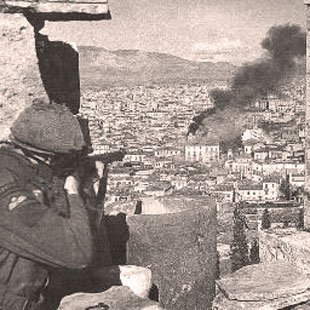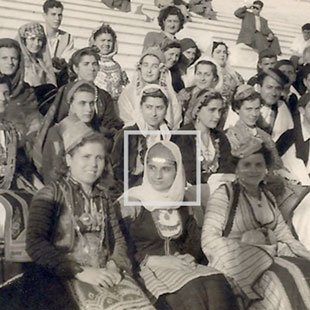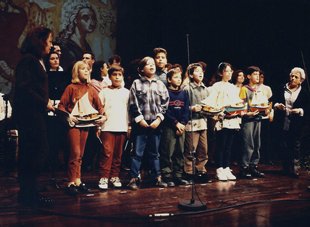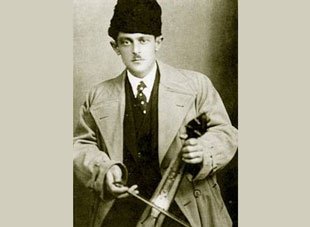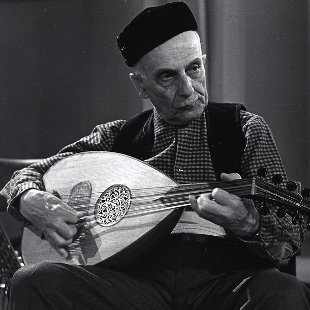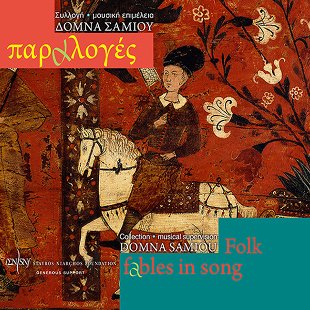You are at: Home page Her Work List of Songs Arta’s Bridge
Της Άρτας το γεφύρι
Listen
Lyrics
Down on the shore where land meets sea,
where the world ends,
they set to building a bridge,
but the bridge would not stand firm.
They’d build it through till evening
and find it fallen every morn.
In the dead of night, they’d quake as shrieks rang out.
– Build a human soul into its foundations,
or this bridge will never stand.
No orphan, mind, nor pauper, no foreigner from far away,
only the master builder’s fair wife will do.
[Messages dart back and forth betwixt bridge and master’s door.
– Mistress, come, the master wants you.
– What could the master want at this time of day?
If it’s glad tidings you summon me for, I shall don my finest
if it’s far bad tidings, I’ll wear sackcloth and ashes.
She adorned herself for three days and three nights.
She wore the sun for her face and the moon on her breast,
with eyebrows as sleek as the crow’s coal-black wing.
She walked in the shade, lest the sun darken her skin.
At the sight of her, the master builder was moved to tears.
– What ails you, husband, why weep and sigh ye so?
– My wedding band has fallen, fallen inside the bridge.
– Then, husband, dry your tears, for I shall fetch it for you,
and she climbed into the foundations and rolled up her sleeves.
Then prentices rushed forth with clay, builders with grit
and the master builder with a little lime.
– Malignant prentices, evil builders, take not another step.
I have three things to say before you wall me in:
My door is unlocked and my babe’s in his cradle.
Cradle, rock my child to sleep, cradle calm his fears.
And if he wants to suck, go nurse him.
Three sisters are we but we share a single fate:
one’s walled up in the Danube bridge, the other at Kastraki.
and me, ill-fated me, in Arta’s bridge.]
Translated by Michael Eleftheriou
Original Lyrics
Της Άρτας το γεφύρι
Κάτω στην άκρη του γιαλού
Κάτω στην ά- κάτω στην ά- κάτω στην άκρη του γιαλού
στην τέλειωση του κόσμου, στην τέλειωση του κόσμου,
εκεί γεφύ- ν-εκεί γεφύ- εκεί γεφύρι κτίζανε,
γεφύρι δε στεριώνει, γεφύρι δε στεριώνει.
Από βραδίς το κτίζανε και το πρωί χαλούσε.
Ακούν φωνή, ν-ακούν στριγγλιά μέσα το μεσονύχτι
– Α δεν κτίσετε άνθρωπο, γεφύρι δε στεριώνει.
Ούτ’ ορφανό, ούτε φτωχό, ούτ’ απ’ τα ξένα ξένο,
μόνον του πρωτομάστορη την έμορφη γυναίκα.
[Μηνύματα παν κι έρχονται στου μάστορη την πόρτα.
– Έλα μαστόρισσα εκεί κι ο μάστορης σε θέλει.
– Τι να με κάν’ ο μάστορης τώρα το μεσημέρι;
Αν είναι θλίψη να θλιφτώ κι αν είν’ χαρά ν’ αλλάξω.
Ήμπε και ηστολίζουνταν τρεις μέρες και τρεις νύχτες,
βάζει τον ήλιο πρόσωπο και το φεγγάρι αστήθι
και του κοράκου το φτερό βάζει καμαροφρύδι.
Τον ίσκιο ν-ίσκιο πήγαινε μην τη μαυρίσ’ ο ήλιος.
Καθώς την είδ’ ο μάστορης τα δάκρυα τονε πήραν.
– Τι έχεις μάστορη και κλαις και βαριανεστενάζεις;
– Το δαχτυλίδι μου ’πεσε μέσα εις το γεφύρι.
– Έννοια σου μάστορη μην κλαις κι εγώ θα σου το βγάλω
Ήμπε κι ενεσκουμπώνονταν μέσα εις το γεφύρι.
Τρέχουν ’πουργοί1 με τον πηλό, χτιστάδες με τη λάσπη,
τρέχει κι ο πρωτομάστορης με λίγο ασβεστάκι.
– Σταθείτε βρε κακοί ’πουργοί και σεις κακοί μαστόροι
τρία λογάκια να σας πω κι ύστερα κτίσετέ με.
Έχω το σπίτι μ’ ανοιχτό και το μικρό στην κούνια.
Κούνια μου κούνα το παιδί, κούνια μου μέρωνέ το,
κι αν σου γυρέψει και βυζί, σήκω και βύζασέ το.
Τρεις αδελφάδες ήμαστε και οι τρεις μια μοίρα είχαν,
η μια ’χτισε το Δούναβη και η άλλη το Καστράκι
κι εγώ η βαριορίζικη της Άρτας το γεφύρι.]
1’πουργοί: υπουργοί, βοηθοί
Information
- Region: Sporades
- Area: Skiathos
- Categories: Ritual Song, Fable Song (Ballad)
- Rhythm: 4 beats
- Dance style: Local dance
- Duration: 02:40
Collaborators
- Singer: Yiorgis Tzoumas
- Informant (source of the song): Yiorgis Tzoumas
Albums
Notes
According to primeval pagan beliefs, the demonic forces that inhabit and govern Mother Nature demand something in exchange if they are to give their blessing to man’s interventions. So to firm the foundations of a major construction, the spirits must first be appeased with an offering of equal import; they demand blood: a human sacrifice. The soul of the victim will become a spirit in its turn, acquire invincible powers and protect the structure from all threats, natural and supernatural, in perpetuity.
The forgotten memory of ritual human sacrifice, a practice known in all societies, was preserved down the centuries orally in the form of legend. In Europe, of all the countless legends and traditions relating to human sacrifice, the macabre myth of the ‘haunting’ –the young woman walled into a large bridge, the spirit’s price for securing its foundations–is unique in assuming poetic form. This narrative song is widespread among the peoples of South-east Europe, Hungary and the Balkans. In Greece, Cyprus, the Greek islands and Asia Minor, it is known to all as the song of Arta’s bridge, and the bridge in question is mentioned in most of its variants.
Despite its fabulous nature, the dreadful murder the song describes would be hard to accept if the song did not echo the sacred nature of such sacrifices. That the song is danced ritualistically without instrumental accompaniment at Easter, the great Christian feast of death and rebirth, may be indicative of this intuitive memory, the wife of the master builder becoming one of the anonymous, emblematic dead venerated in the spring. Miranda Terzopoulou (2008)
Local dance, danced to the steps of the dance "kamara".
Recording information
Domna Samiou taped the song in Skiathos, in 1975.
Watch a different version of the song by locals of Skiathos
Member Comments
Post a comment
See also


Song
Arta’s Βridge
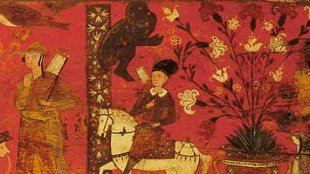

Song
My Son, Why Dont You Go and Wash?

Song
One Easter Day, One Sunday
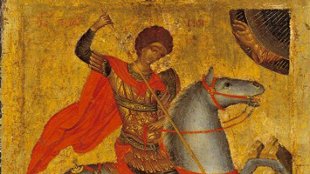
Song
Song of Saint George

Song
The Song of Saint George

Song
A Festival Is Being Held

Song
A Little Shorty (Skiathos)

Song
Forty Stonemasons

Song
Giannos and Vangelio

Song
It Is May Month

Song
It’s Eastertime

Song
Maria’ S Gone to Pick Some Lilac

